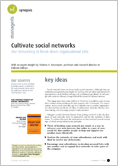
Synopsis
This article is one of the sources used in Manageris’ synopses:

Motivational springboards for your workforce
How can you implement an effective retention strategy? Managers play an essential role in motivating a diverse employee population.

The coaching manager
The most delicate role of managers is not to tell staff members what to do and how to do it, but to help them change their behavior.

Becoming a top executive: a change in perspective
When taking on a top management position, executives must realize that they need to change their mindset accordingly.

Self-confidence: a professional quality to be developed
Self-confidence is a quality in the workplace, as it helps people build constructive relationships, dare to take risks, etc. So, how to develop and actively maintain your self-assurance?

Overcoming resistance to change
Change is emotionally draining on employees. To surmount resistance, companies must understand the underlying psychological barriers.

Obtaining commitment through participation
How can you get the people of your organization to commit themselves and show a sense of initiative? By creating the conditions that enable them to participate in the company strategy.

Stimulate creativity in the field
How to stimulate the creativity of your employees? In addition to establishing sophisticated systems to collect ideas, companies would do well to adapt management practices accordingly.

Generation Y at work
The attitudes of the youngest generation to enter the workforce reflect a profound sociological shift. Understanding this generation better is essential to work with younger employees more effectively.

Manage costs sustainably
Hypercompetition has led to generalized cost reduction programs. But how to ensure that these programs generate lasting results?

The delicate art of delegation
Organizations need to be agile and responsive, and this means empowering employees. But how to avoid the many dangers of poorly managed delegation?

Information, a strategic asset
More than ever, companies have access to an impressive wealth of information. But they can only fully capitalize on this strategic asset if they develop a real information management strategy.

Make better decisions to be more responsive
For a company to become more agile, managers and leaders must make decisions faster and more frequently. How to avoid negatively affecting the quality of decisions?

Developing a greener offering
Customers now generally expect companies to be environmentally responsible. Businesses that ignore this expectation risk being sidelined!

Reinforce your collective execution skills
How to create the conditions for effective and concerted action within your teams? By establishing a context that instills a sense of accountability and urgency to take action… in the right direction!

Adopting innovations developed outside your organization
Innovation is subject to fashion trends. Lucidity, strategic thinking and rigorous analysis are valuable assets to avoid wasting a lot of energy.

Customer service: cost center or competitive advantage?
Taking the time to listen to customers may well be an effective way to identify their problems and understand their expectations better.

The keys to lateral leadership
Today, hierarchical authority is becoming less effective in obtaining the adhesion of partners and employees. Managers must thus develop their lateral leadership skills.

What is the best approach to using social networks?
Social networks offer new perspectives in marketing approaches. How to fully tap these opportunities to really get value from them?

Combat misunderstandings
Many psychological traps make interpersonal communication difficult. How can you combat misunderstandings and communicate better to facilitate interactions?

How can the board of directors add more strategic value?
In an uncertain economic context, how can the board of directors add real value to the quality of strategic company decisions?

HR as strategic partner
More than ever, the HR division has a major role to play in corporate strategy. How to assume these responsibilities without being overwhelmed by day-to-day operational emergencies?

Foster collaboration within your leadership team
An executive committee’s ability to work as a team has a major impact on a company’s performance. What key drivers can be used to break down silos in the leadership team?

Toxic work environment, a real management issue
The quality of the ambiance at work is largely rooted in the management model, and has major repercussions on performance. How to combat infighting and other types of toxic behavior?

Habit marketing
Rather than trying to respond to clearly identified customer needs, companies may do better by working to become part of their routine.

Make compensation a key motivational driver
What compensation policy to adopt to foster employee adhesion and stimulate company performance sustainably?

The dangers of success
Success itself is often the root cause of failure, as people become lazy and arrogant, or overly optimistic about the future. How to recognize and avoid the traps of success?

Protect yourself against strategic blindness
Companies that believe they are invulnerable are particularly exposed to a rude awakening. How can you guard against the tendency to ignore unpleasant truths?

Changing behavior
How can you ensure lasting change and avoid falling back into the same old habits? Lasting behavioral change requires a combination of logic and emotions.

Creating value in an interconnected world
In an unpredictable environment, the key to agility is not necessarily possessing proprietary resources, but being able to mobilize those required when needed.

How to become a good listener
The ability to listen is both one of the main tools of managerial influence, and the most underestimated. How can you use it to improve your interpersonal skills?

Promote accountability in your organization
How can leaders get their teams to share responsibility for ensuring collective success?

Gender diversity for better performance
Beyond ethical considerations, how can you capitalize on the complementary leadership styles of men and women to reinforce organizational performance?

Decision-making traps
Decision-making processes are strewn with traps. How can we identify and avoid the psychological biases that cause us to make mistakes?

Manage informal performance factors
Lack of motivation, withdrawal, resistance, and infighting are all phenomena difficult to control with formal management drivers alone. How to influence informal performance factors?

Build a constructive relationship with your boss
Employees are frequently frustrated by their relationship with their boss. Is this inevitable? Not necessarily. For the relationship to be successful, employees and their superiors must share responsibility. How to define your positioning as a subordinate?

Leading cross-functional teams
Cross-boundary teams can help break down organizational silos and reinforce responsiveness. However, coordinating teams that cut across organizational boundaries is a real challenge. What key drivers do employers possess to accomplish this?

Cultivate social networks
Networking is an effective driver to break down organizational silos. How to build your own network and encourage your subordinates to do so as well?

Effective upward management
How to develop a constructive relationship with your hierarchical superior? By basing this relationship on mutual respect, understanding and by seeking areas of complementarity.

Making work more meaningful
How to prevent employee motivation from dropping over time? By giving more meaning to their work.

The ethnographer’s eye
Numerical data alone is insufficient to grasp the whole reality on the ground. How can the ethnologist's perspective help executives, through a better understanding of how teams work, to succeed in bringing about change?

Activating the full potential of your team members
Some leaders are able to significantly boost collective performance by bringing out each individual’s hidden strengths. How do they manage to make full use of their teams’ abilities?

Managing “enhanced employees”
While artificial intelligence is undergoing rapid development, rare are the pilot projects that succeed in being deployed on a large scale. What role can local managers play in the successful adoption of artificial intelligence?

The keys to proactivity
Employees who seize the initiative: that is every manager's dream. But this attitude is far from being simple to establish in practice. How can we understand the mechanisms of proactivity to turn it into a key to collective efficiency?

Controlling your communication to preserve trust under pressure
Communicating in a way that preserves trust in times of crisis.

Reconnecting with simplicity
Complexity is inherent to the way organizations operate. But while part of this complexity is inevitable, there also exists a superfluous part, which stifles initiative and prompts teams to disengage. How can we control its excesses to reconnect with simplicity?

Promoting intergenerational integration
The age-related stereotypes that permeate representations of the working world are often exaggerated, or even unfounded. How can we move beyond these generational labels to build more fluid and effective work dynamics?

The alchemy of high-performing teams
Particularly effective teams distinguish themselves through a few notable characteristics.

Cognitive flexibility, a key in the face of complexity
In a perpetually shifting universe, being able to evolve one’s mental frameworks according to the context becomes a key skill. How can you develop your cognitive flexibility to better handle complexity?

Three tips to approach dilemmas with creativity
When faced with a dilemma, seek to reconcile rather than to pick a side.

Escaping the trap of workaholism
Companies naturally seek to have employees who are available and committed. But when this commitment, taken to excess, results in an inability to switch off, the consequences are dire. How can we avoid the pitfalls of workaholism?

Creating the conditions for successful mentoring
Mentoring is a valuable lever for employee development. How can we exploit its full potential?

Handling failures productively
Accepting the possibility of failure is essential in order to be able to experiment, innovate and adapt. But on a day-to-day basis, it is very often the need for operational performance that prevails. How can we identify and promote productive failures?

Stepping away from the short term/long term dichotomy
Reconciling differing time horizons to build lasting performance.

Managing complexity without adding complication
Maintaining your organization’s responsiveness and efficiency in a complex environment.

Drawing inspiration from explorers to face uncertainty
Corporate leaders are frequently confronted with turbulence whose consequences are difficult to predict. How can they draw inspiration from great explorers to account for uncertainty in their strategic steering?

Adapting to permanent change
Adapting your approach to management to a context of quasi-permanent change.

Creating momentum around your Climate and Environment projects
Increasingly strategic for the majority of companies, the topics of Climate and the Environment are nonetheless profoundly divisive. How can we move forward on these issues while avoiding the perils of polemics?

Promoting the confrontation of ideas to benefit from diversity
Taking full advantage of diversity requires creating a climate conducive to the confrontation of ideas. How can we create the conditions for a productive debate?

Rethinking the loyalty and engagement of talents
In a working world in which retaining and mobilizing employees has never been so difficult, what can we act on to protect our teams from the widespread trend toward disengagement?

After the merger, achieving successful integration
A few tips to successfully complete a corporate merger.

The unsuspected power of words
Although we often wield words without really paying attention to them, we can also deploy them in a more deliberate manner. How can we lean on recent advances in the field of linguistics to use the keywords that have the ability to open doors?

Making collective decisions more reliable
How can we ensure the full effectiveness of group decisions?

Enhancing your teams’ resilience
In a context in which crises are multiplying, it is precious to be able to lean on teams that know how to react, adapt and quickly return to a high level of performance. What are the foundations of collective resilience?

Developing your intuition for risk
Completing risk-detection systems by cultivating collective intuition.

Encouraging employees’ appropriation of artificial intelligence
To establish a dynamic that allows taking full advantage of AI, we can find inspiration in the example of companies that are pioneers in this field. How can we prepare employees to actively participate in this transformation?

Adapting your persuasion strategy to your interlocutor’s decision-making style
Strengthening our powers of persuasion by adapting to our interlocutor.

Uniting your executive committee
The members of an executive committee must simultaneously position themselves as defenders of the collective interest and defenders of the issues associated with their specific roles. How can we integrate the diversity of visions in a constructive way?

Working as a team to thwart the traps of memory
Overcoming the subjective and imprecise nature of memory by putting various people’s memories in common.

Three sources of misunderstanding to overcome for better communicating
Developing the quality of your communication by avoiding misunderstandings.

Better integrating employees with disabilities
People with disabilities face considerable difficulties in finding employment within companies. Beyond regulations and quotas, how can we act to enable disabled employees to make their full contribution?

Mergers: building a bridge between cultures
Achieving successful mergers and acquisitions by working to bring cultures closer together.

Realigning culture and strategy
The culture of an organization constantly reshapes itself to remain aligned with strategy. But obstacles sometimes stand in this convergence’s way. How can we draw inspiration from history’s great reformers to succeed in transforming our culture?

Tempering change
Limiting the negative repercussions of change by adopting a more measured approach.

Brilliant, over-performing employees… How should we manage them?
Managing outstanding employees creates real challenges in terms of integration and support. How can you take inspiration from the experience of coaches of legendary sports teams to manage these “star” employees?

Using pedagogy to promote change
Leading the various stakeholders to evolve their view of the situation: an essential lever to achieve major changes.

How to remobilize the teams after a restructuring
Helping your team members turn the page after a difficult transition.

Are potentially disruptive innovations flying under your radars?
What is the possibility that a radical innovation, initially imperfect, will call into question your established positions?

Managing negative emotions within your teams
Negative emotions are often considered undesirable. And yet, they bear very useful information. How can we better manage these perturbing reactions?

Getting a negotiation out of stagnation
Taking inspiration in diplomatic techniques to unlock a difficult negotiation.

Influencing behaviors through nudges
Nudges are techniques, based on cognitive sciences, which aim to guide behaviors without coercion or penalty. How can they be used effectively and wisely?

Valorizing and retaining your experts
As experts take on an increasingly crucial role in companies, their career development requires a differentiated approach. How can we set up dedicated channels to make them feel valued and retain this strategic human capital?

Identifying and thwarting manipulation
Understanding the mechanics of manipulation to better protect ourselves from it.

Shifting from confrontation to dialogue
How can we establish a true dialogue to get the teams to commit to change?

Developing your open-mindedness
There is nothing natural about questioning our own choices. And yet, in a world in which the rules change quickly, it is more necessary than ever. How can we give ourselves the means to quickly reconsider our judgments?

Removing the obstacles to personal initiative
Overcoming organizational obstacles that discourage individual initiative.

Conjugating invention and imitation
Western cultures frequently contrast imitation and creativity. And yet, imitation can be an effective way to develop creative ideas. How can we leverage it to accelerate our innovations and make them more reliable?

Choose your key battles
How can we reduce the number of our strategic priorities to better achieve our objectives?

Why bother making strategic plans?
The value of strategic planning lies primarily in the process of questioning and exchange that it requires.

Exercising strategic leadership
An organization’s success hinges before all else on its leader’s work behind the scenes to ensure the fine-tuning of internal dynamics. How can the workings of this strategic game be mastered?

How to really benefit from spending cuts?
How to make budget cuts without jeopardizing the future?

When can you trust your intuition?
When can we trust our intuition, and when should we be wary of it?

Converting your organization to a digital culture
Although digital transformation has become a necessity, achieving a successful one is more a question of culture than of technology. How can we “change everything” to maintain a competitive advantage in a world gone digital?

Accelerating your environmental transition
The environmental transformation of companies is the most ambitious challenge there is. Although no one is yet claiming to have found a miraculous solution, certain pathways are taking shape. How can we reinvent ourselves to build a sustainable model?

Consultants: What’s the point?
How can you develop your ability to secure good advice?

Mastering the art of data storytelling
Numerical data is at the heart of corporate life. But it doesn’t always have the expected impact, as our brains struggle to fully understand it. How can we present our numbers in a way that makes them more engaging?

Maintaining the social bond in the age of hybrid work
Hybrid work, which combines remote and on-site work, has established itself in many companies, but not without raising several concerns. How can the social bond be maintained and nurtured in these new conditions?

Fostering a more inclusive culture
Diversity, equity and inclusion are invaluable and complementary assets for companies. But converting good intentions into concrete action is far from easy. How can we move forward while avoiding missteps?

Do you speak digital? ;-)
In two decades, digital communication has become omnipresent—not without a certain number of difficulties. How can you master the codes of digital communication tools?

Manager-coaches faced with the fears of their teams
Fear is ubiquitous in companies. Often considered a weakness, it can also prove fundamentally useful. How can managers help their staff manage their fears and overcome them?

Rehabilitating sensitivity within the company
A high level of sensitivity is rarely well regarded in the workplace. Yet this way of operating has numerous advantages. How can we give highly sensitive persons the room they require?

Strengthening cybersecurity
The risk of cyberattacks concerns all companies. Far from being the sole concern of the IT teams, cybersecurity must become a collective response. How can you develop a culture of shared vigilance?

Hybrid work: new challenges to be met
Most companies are moving toward a hybrid work organization, combining on-site and home-based work. How to benefit from remote work while maintaining collective strength?

Human error, the greatest safety challenge
Human errors are the source of most accidents. And they are often due to staff who were neither incompetent nor careless. How can we make our actions more reliable by developing a safety culture?

Taming procrastination
Tending to postpone until the next day what we could be doing that same day is a natural mechanism to manage our emotions. Rather than fighting this temptation, how can we channel it, or even take advantage of it?

The future of work: seven mutations to anticipate
The Covid-19 crisis will probably engender deep and irreversible changes in the organization of companies. How can you accompany this transformation of the world of work to draw a desirable future?

Experiment in the age of data
Relying on the current capabilities of data processing, many companies have placed continuous experimentation at the heart of their innovation strategy. How can you develop the rigor required for such an approach?

Anticipating climate change
An increasing number of companies are considering climate risks. How can you review your strategy and economic model to reduce your exposure and adapt to the carbon-neutrality objective?

Assert your professional identity
Nowadays, as career paths are rarely linear, professionals must actively manage their career. How can you define your professional identity, make it evolve over time and communicate it with authenticity?

Renewing the creative momentum of your teams
To foster creativity, rather than going to search for talents and methods outside the company, it might be equally beneficial to rely on internal forces. How can you unleash the creativity of your own teams?

Expressing gratitude at work
Making staff feel valued is a demonstrated factor of engagement and performance at work, which managers nevertheless tend to underuse. How can you transform gratitude into an opportunity to differentiate yourself?

Negotiate while protecting the relationship over time
A successful negotiation is foremost one that leads to implementing an acceptable agreement for each of the parties involved. How can you pursue your interests whilst protecting a constructive relationship with the other party?

Supporting a painful reorganization
The difficult context often leads to taking painful measures, which can damage staff motivation, or even the social climate. What posture can managers adopt to ease these transformations?

Adapting to unsolicited change
We are subjected to change more often than we trigger it, which can cause a significant psychological burden. What process can we adopt to handle the feeling of loss that inevitably accompanies change?

Successfully onboarding new employees
Very few companies have a really satisfying onboarding process. Yet, the latter largely determines the commitment and loyalty of the newcomers. How can you welcome new staff members really well?

Reinforce your company’s societal commitment
Companies have a strong impact when they place their firepower at the service of societal challenges. But this requires a new way of thinking and new competences. How can you deliver on your CSR commitment?

Facilitating open expression in the company
Knowing how to speak honestly to one another is absolutely critical inside a company. Yet, many reasons push us, on the contrary, to hold our tongue. How can we set up the necessary conditions to enable free expression?

Innovate like a start-up
The rise in power of digital innovations is often perceived as a threat to the established players. In the face of start-ups, how can they reinvent themselves to win the race for innovation?

The age of influencer marketing
As they face the erosion of the advertisement discourse, some brands call upon influencers to capture the attention and the sympathy of web surfers. How can you put in place an efficient influencer marketing strategy?

Deciding while under pressure
When we make decisions, we are inevitably subjected to biases—that are all the more powerful when we are under pressure and the stakes are at their highest. How can you nonetheless secure vital strategic decisions?

Preparing for an uncertain future
In times of turmoil and strong uncertainty, how can you manage beyond simply coping with the situation? One solution consists in accepting the inevitable nature of uncertainty: the challenge comes not in minimizing it, but in managing it.

Foster radical innovation
Innovation is at the heart of company priorities. Yet, large organizations mostly limit themselves to marginal innovations while leaving start-ups the prerogative for disruptive innovations. How can you set up an environment that is propitious to radical innovation?

Artificial intelligence, beyond experimentation
Artificial intelligence applications are multiplying in all sectors of activity. But many companies are struggling to develop beyond the experimentation stage. How can you reach a new level and take advantage of AI’s full potential?

Sharpen your attention focus
Our work environments do not lend themselves easily to concentration. At the time and age of collaborative spaces and new technologies, how can you stay in control of your attention focus and maintain your personal productivity?

Liberate initiative taking
To be able to take initiatives, one must dispose of a context favorable to risk-taking. How can you develop a climate of psychological safety, a true key to the performance of teams and organizations?

Selling your innovative ideas
Any innovative project owner faces a paradox: the novelty nature of his/her idea is precisely what gives it value; yet, it is also what generates reluctance. How can you release these brakes to get your innovative ideas across better?

Get back into the habit of asking questions
Business leaders are rarely presented as people who question themselves. And yet, a manager needs to know how to question as well as to assert; but this ability seems to have been somewhat lost. How can we find it again?

Management by objectives in the agile era
When management by objectives takes into account the constraints of the agile era, it remains a formidably effective tool. How can you help your teams choose and reach their objectives in a context of uncertainty and permanent change?

Evolving the company culture: a pragmatic approach
Evolving the company culture is one of the main challenges to conducting successful strategic transformations. How about relying on the existing rather than venturing into a logic of disruption?

Refreshing competences continuously
The rise in employee competence represents a major competitive challenge for companies. How can you rethink training to reinforce the acquisition of competences essential to tomorrow’s world?

How to be an inspiring leader
If employees feel increasingly less committed to their work, this is due to the attitude of their managers among other things. How can management stimulate their staff’s engagement?

Furthering diversity
Knowing that diversity is a source of performance, many companies try to attract more personnel with varied profiles. Yet, they also need to be able to really take advantage of this diversity. How can you integrate these staff without erasing their differences?

Adapting in the age of on-demand talent
Nowadays, as self-employment experiences a new surge, companies must adjust to this new situation. How can you attract, develop and retain staff members you no longer “own”?

Reaching an executive management position
Becoming a senior executive does not only involve taking on extended responsibilities: the conditions of success are often different from what we expected. How can you best prepare for these new demands?

Driving change
Among all the factors that contribute to the success or failure of transformation initiatives, the attitude of staff towards change is absolutely decisive. How can you convince them to engage in the effort towards transformation?

Thinking differently
We all have a natural preference for what is familiar to us. Yet, to adapt, companies and their staff must constantly reinvent themselves, which requires that they get out of their usual thinking patterns. How can you nurture this healthy habit?

Addressing the upheavals of the global markets
The globalized organization is generally considered to be a reference model. Yet, distance remains a real obstacle, all the more so since this model is today confronted with several disruptions. How can you rethink your performance levers on international markets?

Implementing Design Thinking
Based on proximity to the end user, on pragmatism and agility, Design Thinking promises to boost innovation. But this method can prove demanding to implement. How can you make the best possible use of it in your organization?

Dealing with a “difficult” boss
What can you do when faced with a “difficult” boss? Rather than enduring him/her, you should rather seek to modify your relationship with him/her. By understanding the underlying triggers behind your hierarchical superior’s stance, how can you influence his/her attitude and behaviors?

Successfully implementing telework
Remote work presents clear benefits for both staff members and employers. But this organizational model presents many challenges for managers. How can you adapt your style of management to really take advantage of remote work?

Evolving towards circular economy
“Extract – produce – dispose”: against this linear economic model, nowadays reaching its limits, a new model is emerging. Circular, it aims at minimizing, regenerating and recycling resources. Why and how to initiate this transition?

Own your position as a manager-coach
Most managers tend to focus more on operational matters than on the development of their team members. Beyond a scheduling issue, it is more a matter of personal stance. How can you be an effective manager-coach?

The art of creating memorable moments
What makes some moments more memorable than others? Discover the cognitive mechanisms that explain those special moments: you will then know how to orchestrate them for your customers and team members.

Collaborating with robots: ethical and human challenges
Implemented by an increasing number of companies, artificial intelligence solutions raise ethical and social questions that are as yet largely unresolved. What challenges should you prepare yourself for?

Liberating the company: returns of experience
The notion of a liberated company remains controversial: some see in it as an ideal model, others as a deception. In any event, it raises a key question: how can you combine individual autonomy and collective efficiency?

Religion and business
Confronted with the expression of religion in the workplace, companies and managers often feel powerless. How can you maintain proper functioning of the organization while respecting everyone’s rights?

Optimizing employee experience
An increasing number of companies are striving to treat their employees as well as they treat their clients. How can you rely on employee experience to develop your company’s performance and attractiveness?

Managing emotions during a negotiation
Emotions play a major role in the course of a negotiation. How can we learn from recent research in behavioral psychology and neuroscience to take advantage of these emotions, rather than suffering from them?

Addressing the quest for meaning
The issue of meaningfulness has today become a determinant in the life of business organizations. How can we identify our purpose and that of our companies—and transform this into an individual and collective performance engine?

Do you make a good impression?
We do not all have the same innate level of charisma. Yet, we can identify the factors that influence the perception others have of us. How can we take advantage of this to ensure we make a good impression?

A more powerful memory
Having a good memory is an undeniable advantage; it helps reinforce influence, and attract credibility and respect. Luckily, memory is not an innate capability: with some technique, you can train it. How can you develop your memory?

Gaining in eloquence
Presenting ideas verbally is never an easy task. Beyond solid arguments, speaking the right way is necessary to catch an audience's attention, and push them to take action. How can you maximize the impact of your spoken message?

Contradictions, a source of innovation?
Great leaders are able to surmount apparent contradictions to devise original solutions that bridge the two initial options. How can you draw inspiration from their example to turn dilemmas into a source of creativity?

Artificial intelligence: beyond the buzz, a major challenge
Today, artificial intelligence offers huge potential, while raising as many hopes as fears. Indeed, while the gains are undeniable, implementation is not straightforward. What conditions are required to take advantage of AI?

Dare to express your views
Paradoxically, in a business world branded as tough, managers often have a hard time expressing clearly what must be told. It is because this requires a self-confidence that is not always well established. How can you develop this quality?

Neuroscience and change
Our brain likes habits. To the extent of being opposed to any change? In reality, neuroscience demonstrates that we can adapt our practices in change management to the functioning of our brain.

Improve your personal productivity
Paradoxically, the productivity of business organizations has decreased over the past few years. Thus, our tendency to confuse being busy with being productive leads us to waste 25 to 40% of our working time. How can we regain these lost hours?

Joining the leadership team—what are the stakes?
Being appointed to a senior executive position or entering the executive committee sounds like a consecration. But the transition often proves much more difficult than imagined. How can you prepare for this major change?

Co-design: Knowing how to dialogue
In a digital era that forces us to be more agile, open and cooperative, the aptitude for dialogue is an essential condition to innovate and adapt. How can you develop your ability to hold constructive team discussions?

Online communities: How can we develop their value?
Employee, customer or expert communities are a real asset for companies. However, for them to succeed, the organization must involve itself—to a certain extent. How can we create the conditions for such a dynamic?

Reinforce the company culture
Companies with a strong culture perform better over time than their competitors. But what is meant by company culture? And how can you turn it into an asset to mobilize your teams?

Employees 3.0: how to manage them?
The digital revolution has deeply changed staff members’ expectations: less formal and more personalized relationships, greater flexibility in career choices… How can you evolve your HR management accordingly?

Combine efficiency and benevolence
It is possible to manage while reconciling efficiency and benevolence. But between performance imperatives and employee fulfillment at work, the dosage is subtle. How can you find and maintain the right balance?

Improve the creative dynamic in your teams
Team creativity largely depends on the ability to build on the ideas of others. How can you draw on theatrical improvisation techniques to optimize the quality of creative discussions?

Implementing a successful reorganization
In a context of permanent change, companies need to reorganize frequently—but results are rarely satisfying. How can you maximize your chances of success in a reorganization initiative?

Increase the resilience of your organization
All organizations are confronted with the risk of crises. Rather than vainly attempting to avoid them, it is better to develop the capability to absorb them and to learn from them. How can you acquire and cultivate resilience?

Boost the involvement of your teams
Teamwork is not always a guarantee of effectiveness. Yet there are companies where teammates pull each other towards the top. How can you draw inspiration from these experiences to develop teams that are both committed and in pursuit of excellence?

Feedback, an uncomfortable but invaluable exercise
Feedback is often an uncomfortable exercise both for those who give it and those who receive it. Yet, it almost always brings useful insights. How can we derive greater benefit from the feedback we receive?

The new era of analytical marketing
The recent technological disruptions have deeply modified the value creation methods in businesses. What are the growth opportunities deriving from analytical marketing, and how can you organize to succeed in this transition?

Promote and retain talented women
Despite recent measures in favor of gender diversity, the fact remains that the proportion of female talent decreases as one moves up the hierarchy. How can we remedy this situation?

Collaborate with your customers
While the digital revolution has given consumers the possibility to involve themselves in the life of companies, very few businesses actually take advantage of this opportunity. How can you transform your consumers into privileged partners?

The illusion of objectivity
Reflexive thinking is indispensable to react and make decisions efficiently, but may also distort our perception and ossify our way of thinking. How can we avoid being trapped in our cognitive illusions?

The art of negotiation: A delicate balance
Negotiations are not just power struggles. The most beneficial agreements are obtained by also seeking ways to best respond to the interests of the other party. How can you manage this delicate balance?

Social intelligence in the age of remote relationships
How to develop our interpersonal skills?

Base your strategy on your distinctive capabilities
The race for competitive advantage often leads to endless escalation. How can you break this cycle? One solution is to refocus your strategy on the specific capabilities that strongly differentiate your company.

Achieve success with extended collaborations
Some innovations cannot stem from a single company. In domains such as radical innovation or sustainable development, the concerted mobilization of numerous actors may be necessary. How can you successfully achieve such extended cooperations?

Get the most from your consultants
Businesses increasingly rely upon outside consultants, but are often disappointed with inconclusive results or difficult-to-manage relationships. How can you make the most of your consultants?

Managers as motivation facilitators
Motivating employees is an arduous task, particularly since people cannot be motivated against their will. So, how can you help your team members be proactive in finding their own intrinsic motivators?

Differentiate through corporate identity
To differentiate a company in saturated markets, its project, convictions and culture are increasingly important. How can you promote them in a compelling and credible manner?

Successfully transitioning to the self-managed enterprise
While the ”liberated company” model provides a solution to agility challenges, it involves a real disruption in organizing the relationships among employees. What does it take to achieve such a radical change?

Develop the employability of your staff members
In today’s world, employees seek an environment that enables them to develop their competencies so as to continuously enhance their employability. How best to respond to this demand?

Generation Z: What to expect?
Generation Z, born in the years 1990-2000, is now arriving on the job market. Beyond prejudice, how can you take the specific characteristics of these young employees into account and successfully integrate them into your business?

Make use of everyone’s talents
Each of us has specific talents that enable us to excel in certain activities. How can you organize yourself to identify the individual qualities of your team members and leverage them?

Grab attention… and keep it!
In the era of infobesity and chronic distraction, how can you grab your audience's attention and retain it over time? Understanding the psychological and cognitive underpinnings of attention is invaluable to achieve this goal.

Collaborate… but not too much!
In today’s working environment that favors teamwork, concentrating has become a challenge. It is nonetheless a factor of productivity and well-being. How can you give everyone the possibility to secure periods of real concentration?

Introverts and extraverts: How to cooperate better together
Far from being respectively a virtue and a fault, extraversion and introversion are two personality poles that both have their assets and limits. How can we turn these differences into a key to collective performance?

The holacratic company: beyond the utopia
The concept of the holacratic company attempts to give employees a maximum of autonomy by eliminating the constraints which hobble initiative. What underlies the success of organizations which have adopted this management approach?

Navigating uncertainty
Geopolitical conflicts, climate change, technological disruptions… Uncertainty is now permanent and extended to every domain. What reflexes need to be acquired to approach uncertain situations with dynamism and optimism?

Feed your creative spark
Brilliant insights often spring to mind unexpectedly. These “Eureka moments” don’t happen by chance and aren’t the exclusive preserve of a few creative geniuses. How can we create the conditions for this creative spark to arise?

Break down organizational silos
“Siloed” organizations, which used to be highly effective, prove less relevant in today’s complex environments. How can we avoid the downside of an organizational model in which we had previously found so many qualities?

Secure your strategic decisions
Many decision-making errors derive from reflexes that lead to form a truncated view of reality. How can we avoid this risk? By engaging in debate that allows us to confront different viewpoints.

Take responsibility for change
To make things change, we have a lot more leeway than we think. How can we take responsibility for creating the changes we want to see implemented?

Devise successful coopetition strategies
“Coopetition”—that is, forming an alliance with a direct competitor—is a strategy that can be very effective, but whose mechanisms are not very intuitive. How can you put together all the assets to succeed at this type of alliance?

Really know your customers
Surveys conducted by companies to know their customers better often result in failures in launching or improving their products and services. How can you make customer surveys more reliable?

Preserve critical know-how
A large part of a company’s strengths resides in the tacit know-how of many individuals. This know-how is not easy to identify and formalize. How can you avoid losing this invaluable capital?

Differentiate yourself in saturated markets
In saturated markets, competitors generally fight on commercial presence and price. Yet, there are other ways for businesses to differentiate themselves. How can you play on services and positioning to gain a competitive edge?

Dare talk about prejudices
To manage diversity effectively, it is necessary to dispel the taboo that often surrounds prejudices. How can we identify them and counter their harmful effects?

From manager to leader
High-performing managers are sometimes surprised when they don’t get a promotion or are evaluated below their expectations. Indeed, even in operational positions, managers must demonstrate leadership qualities such as strategic perspective, the ability to influence others and to lead change.

Negotiate with agility
Far from being restricted to a balance between well-established forces, negotiation is a process highly subject to uncertainty. How can you maximize your chances of success by developing your ability to adapt to the unexpected?

Intrapreneurship: A growth vector to explore
Is the entrepreneurial spirit only for start-ups? In established businesses, the capacity of employees to support innovation is often stifled. How can you help intrapreneurs reveal themselves in your organization?

Retain your lucidity despite the isolation of leadership
Retaining a sense of lucidity about ourselves and the situations we manage is all the more difficult when we are in a leadership position. So how can we preserve our capacity for judgment?

Develop your resiliency
In companies focused on agility, leaders are torn between expectations of clear-cut decisions and the necessity to adapt to changing conditions. In this context, how can they move forward without burning out?

Make the digital transformation in time
The few companies that have been able to take full advantage of digital technologies show exceptional profitability ratios. How can you take inspiration from the practices of these digital champions?

The new innovation leader
Innovation is often seen as the work of a visionary genius. Yet, other innovation leadership models exist that are more accessible. How can leaders create an environment conducive to the creativity of their teams?

Big Data: Making the most of the revolution
Beyond the capacity to process gigantic volumes of data, Big Data creates opportunities that are still largely untapped. How can you take advantage of this huge field of innovation?

The future of marketing
The Internet has dramatically changed the way consumers make buying decisions. In the age of the web consumer, what are the new influence drivers marketing can use?

How can you act as a leader in an uncertain world?
In a context of chronic uncertainty, the image of the bold visionary is obsolete. How can we rethink leadership to regain the ability to set a compelling course and organize our action coherently?

Surround yourself with the best
50 to 70% of recruiting decisions turn out to be unsatisfactory. Yet it is possible to do significantly better, for recruiting can be learned. What lessons can we draw from the experience of recruiting professionals?

Support customer orientation in the field
The least qualified employees are often the ones in direct contact with customers—with a major impact on the perceived quality of service. How can you develop customer satisfaction through the engagement of your front-line employees?

The secret of successful alliances
Alliances can provide considerable development leverage—provided that they run effectively on an everyday basis. How can you draw lessons from experience to maximize the chances of success?

Taking a job abroad
A move abroad constitutes a challenging time. Cultural differences, especially, are manifested in a more complex way than foreseen. How can one decipher their impact more effectively to succeed in this job transition?

Change management: The new deal
Nowadays, change no longer consists in moving organizations from a stable starting point to a stable target point. How can we revisit change management best practices to take into account this reality?

Encourage cooperation
Cooperation between teams is a key driver of agility, but it is not easy to establish. How can we create the conditions to get people to want to invest in the collective game?

Ask questions to engage people
The culture of questioning is not widespread in corporate circles. Yet it is an invaluable driver of engagement and progress. How can we get the most out of it to mobilize energies?

Aligning the Procurement function with CSR
Committing to the road to sustainable development is an all the more effective approach when it also involves suppliers. How can we give the Procurement function the means to fully play its part in this strategic mission?

Stimulating your creativity
Faced with the need to innovate, we can organize ourselves to generate ideas in sufficient numbers for some of them to bear fruit. And artificial intelligence tools can help us push back the borders of our creativity.

Boosting efficiency: new opportunities to explore
Is it still possible to gain in efficiency when everything has already been tried? In a complex environment where traditional methods prove counterproductive, other drivers must be found.

Disseminating your best practices
How to spread a technique that has proven successful locally to the entire organization? This can be learned from the example of companies that have successfully disseminated their know-how.

Revitalize your strategy
To stay afloat facing accelerating competitive shifts, businesses must regularly regenerate their strategies. But how can they reinvent themselves while so many forces support organizational continuity?

Build an effective board of directors
Some boards of directors have been able to go beyond their traditional supervisory role to position themselves as true partners working with operational leaders to boost company performance. How did they go about this?

Be a motivating manager
Motivation has a direct impact on people’s performance. But how can it be sustained? The attitude of superiors has a decisive influence on the satisfaction that people derive from their work, and by extension, on their motivation.

The keys to a successful job transition
Job transition is a hazardous moment. Especially, care must be taken not to rely too much on past strengths, as the new role may require new attitudes. How to make this transition successfully?

Attention, key to performance
Better managing our time is not the only way to increase effectiveness. Our capacity to pay attention and concentrate also has a major impact on performance. How can we develop this ability to focus?

Combine economic and social performance
In an economic crisis, social responsibility or environmental performance issues are often relegated to the background. How can businesses turn CSR into a source of strategic innovation and creation of economic value?

Successfully conduct your Lean Management approach
Adopting a Lean Management approach bestows a major competitive edge to some companies… and brings disillusionment to other ones! What are the key drivers to instill the Lean approach successfully?

Work on your authority
If the focus is today on cooperation, autority still remains an essential ingredient of performance. How can you develop your power and leadership to maximize the value you bring to the organization?

Integrate the human factor to improve project management
The reason why so many projects fail lies less in disciplined project management than in the irrational dimension that influences day-to-day action. How can we integrate this human factor?

Managing managers: Find ways to add more personal value
Managing multi-tiered teams takes much more than a simple quantitative adjustment. An entirely new rapport must be created with the organization to add value in the new role.

Rally the entire workforce for effective change management
What is the secret of the exemplary success of some (too few) transformation programs? Discover how to rally the energies of the whole workforce in order to successfully achieve change.

Create buzz around your offering
Buzz has always existed, but this phenomenon is amplified today due to social networks. In light of recent studies, what are the key actions to support word of mouth around an offering?

Turn your customers into brand ambassadors
Some firms manage to rely on service excellence to turn their customers into ambassadors for their products and services. How to make customer experience a key success factor?

Strengthen your intercultural skills
Working in a multicultural environment is a stimulating, but tough experience. The problem is not as much understanding cultural differences as adapting to them. How can one become a real “cultural chameleon"?

Subconscious roots of purchasing decisions
We are used to see humans as rational beings. Yet, most human behavior is managed automatically by the brain, without mobilizing reason. Can this be used to reinforce the effectiveness of your marketing efforts?

Define an effective resource strategy
Make or buy? This question is central to strategic analysis. Yet, the way it is formulated is outdated: today, it is often more effective to borrow resources. What are the recipes to succeed at this strategy?

Choosing the right leaders in turbulent times
How can one choose future leaders, who will renew the business without alienating its identity? Rather than defining an ideal profile, mixing various styles and experiences is the best way to face today's and tomorrow's challenges.

Harness the power of habit to manage change successfully
Many change projects fail because people return to their former behavioral patterns. Yet this is not inevitable: how can one use habit as a supportive—rather than obstructive—change management driver?

Innovate through experimentation
Experimentation is a powerful innovation accelerator which, thanks to the digital revolution, is much more accessible than before. Yet it remains under-utilized. How can you prompt people to acquire the reflex to experiment with their ideas?

Participative management in the 2.0 era
In times of free exchanges in discussion forums and instantaneous information flow through social networks and Twitter, traditional intra-company communication channels look archaic. How can one foster a real conversation between an organization and its employees?

Rethink leadership
Faced with the challenges and constraints of the 21st century, managers have to adjust their roles and attitudes. How to adapt leadership to the demands of the working world of the future?

Learn cost cutting from low-cost businesses
Low-cost is often assimilated with cheap prices and cheap quality to match. Wrongly so! This dramatically innovative business model has generated major savings. Could low-cost offer new inspiration to improve the profitability of your organization?

Channel your intuition
Our intuition is an astonishing and valuable tool that is always in movement. Subjected to many biases, it may however easily lead us into error. How can we limit this risk to make the most of intuitive thinking?

Luck, a skill to be developed
Without being intrinsically lucky, some people spontaneously do things that make good things happen to them. So what behaviors are conducive to luck, and how to implement them to develop what is actually a real skill?

Take action despite uncertainty
In a world in lasting crisis, the companies that fare the best are those that know how to act and learn at the same time. What operating modes should we adopt to implement this approach?

Reconnect with your ingenuity to boost your capacity for innovation
Long considered as players with low added value, emerging countries are showing a surprising ability to innovate. What can be learned from their innovation approach?

From ideas to action
In every business organization, hundreds of ideas are generated every day, ranging from creative solutions to everyday problems to revolutionary new products and services. What if innovation were principally a question of personal discipline?

Foster your staff’s self-fulfillment
In theory, work represents a major opportunity for personal fulfillment—but the reality is often less gratifying. How can the line manager contribute to helping to rekindle this fulfilling dimension of work?

Stimulate job satisfaction
A recent study shows that energy at work primarily feeds on the conviction that we can progress effectively. How can we use this lever to optimize resources by reinforcing staff work satisfaction?

Lead projects successfully despite opposition
What could be more painful than the emergence of strong opposition to a project? Your attitude towards opposition is decisive. How can you respect your active opponents without neglecting your allies or the silent majority?

Learn to manage the constantly rising flood of information
The human brain is an extraordinary machine for storing and applying information. Could companies learn from how it operates to manage an exponentially growing volume of data more effectively?

Take advantage of the potential of older workers
The global population is aging. However, companies still have trouble fully capitalizing on their over-fifty workforce. How can you elicit the full potential of older workers?

Create a culture of accountability
Our defensive reflexes cause us to hold onto old habits, and thus obstruct change. How can we address issues in a more constructive and responsible manner?

Leader 2.0
The information revolution affects more than processes; it also changes people. How can you adapt management to this new environment?

Cultivate your creative potential
"Agile" companies need inventive leaders and employees. However, one needs not possess an innate gift for creativity to be an innovator. How can we evolve our mindset to develop our creative capabilities?

Happiness, a powerful performance driver
Happiness is not the consequence of success. Research in neuroscience shows rather the opposite: happiness is a success factor! How can we improve performance by cultivating happiness?

Adaptive leadership, a key to sustainable performance
There is no magic formula in management. It's the ability to adapt that makes the difference. How to adjust one's management style to the demands of the situation?

Ensure consistently high-quality customer interactions
The quality of the perceived customer experience depends heavily on the interaction of the customer with a given employee in the field. How to build a collective sense of quality of service in your organization?

Evaluate your employees to enhance their performance
How can you conduct annual performance interviews to motivate people to develop their skills while boosting their short-term performance?

Managing teleworkers
Modern technology has made teleworking easier than ever before. How to adapt management practices to capitalize fully on these opportunities while preserving the quality of teamwork?

The intuitive leader
Our focus on logical reasoning has diminished our appreciation for the importance of emotions and intuition. Yet, intuition can be extremely powerful, provided you don't trust it blindly. How to make your intuition more reliable?

From training to action
Despite investing heavily in training, companies are often disappointed with the results. How to ensure that people make changes in their everyday work as a result of the training they receive?

Price creatively to protect your margin
Companies often slash their prices to stay competitive, even though their consumers would sometimes be willing to pay more. How to price an offering as closely as possible to the perceived customer value?

Escape the time trap
Running increasingly faster seems to be everyone’s challenge. How much of this feeling of constant overload relates to perception, and how much is actual reality? How can you liberate your agenda from self-inflicted constraints?

Foster cooperation across organizational boundaries
Rather than a question of ill will or indiscipline, lack of cooperation is often a result of the need for belonging that governs our interpersonal relationships. How can we take this into account to boost collaboration?

Actively manage psychosocial disorders
Violence, harassment, excessive stress… How can you determine what really comes under the company’s responsibility? And how can you take effective action against psychosocial risks?

The essence of management
Managers are responsible for results which they don't produce themselves. They actually depend on their subordinates. How can they optimize the performance of their teams?

Diversify career management
The working world has changed. Flexibility and personalization are the new watchwords in career management. How can you adapt career paths for increasingly diverse employee profiles?

Grasp the invisible dynamics of the organization
Organizations often have a life of their own, whatever the efforts of their leaders to control it. How can you decode organizational dynamics to better influence them?

IT as a strategic driver
The image of IT departments is often poor among executives and employees alike. How can the IT teams develop their internal credibility as a strategic partner?

Foster disruptive innovation
Game-changing innovations frequently dethrone incumbent players… However, there are many potential pitfalls along the way. How to overcome these challenges?

Turbulence and strategy
Devising relevant strategies in a turbulent context is a tricky job for business leaders, as traditional points of reference for making strategic decisions may no longer be valid. How to take a fresh look at strategy in this new market context?

Understanding your competitors
Many managers give up on anticipating their competitors’ moves. And yet, competitors are less unpredictable than they might appear. How can you leverage competitive intelligence to fuel your own strategic choices?

How to take safety to the next level?
As atypical as they may be, the high-reliability organizations—aircraft carriers, nuclear submarines, space travel installations, etc.—are characterized by a remarkably low number of incidents. How to learn from their methods to raise the bar on safety?











































































